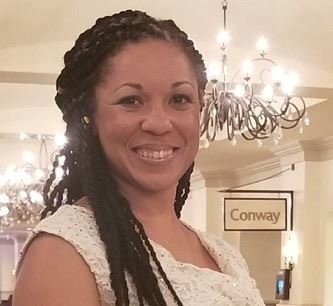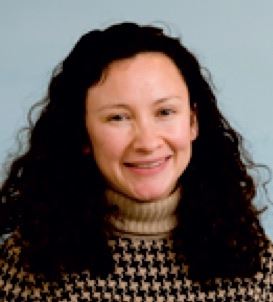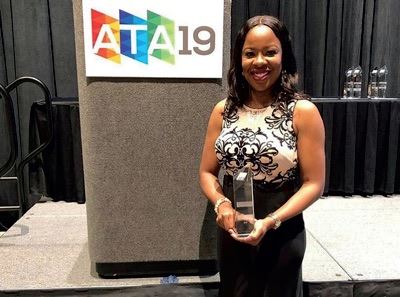.png) |

Reede Scholars Celebrate 10th Anniversary of Health Equity Symposium
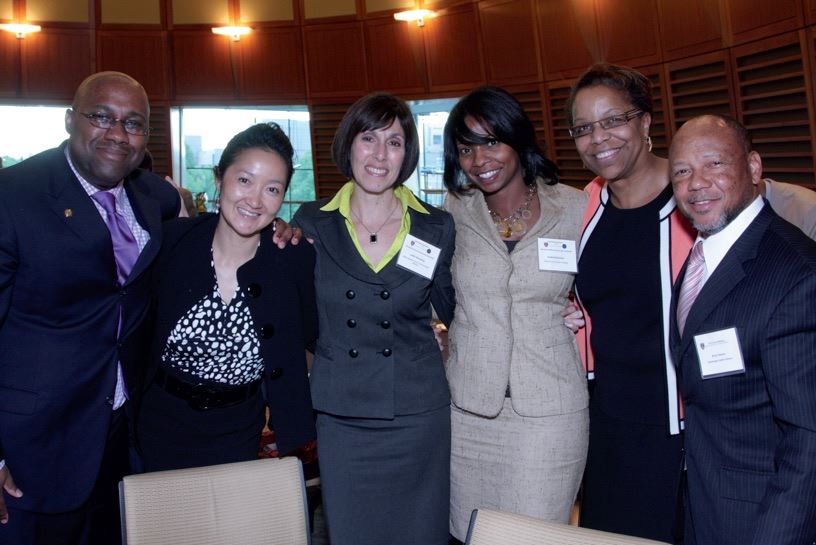 Pictured left to right: Mallory Williams, Monica Le, Judith Steinberg, Audra Robertson, Joan Reede, and Brian Swann.
Pictured left to right: Mallory Williams, Monica Le, Judith Steinberg, Audra Robertson, Joan Reede, and Brian Swann.
On May 6, 2010, The Reede Scholars convened its inaugural Annual Health Equity Symposium. The 2010, theme was “Integration of Care: An Approach to Achieving Health Equity”. Generous funding provided by DentaQuest made this and other symposia possible.
That year, Drs. Audra Robertson, Brian Swann, Monica Le and Judy Steinburg, spearheaded the event. Dr. Brian Swann, RS’07, a Dr. Joseph Henry Oral Health Fellow, approached Ralph Fuccillo of DentaQuest in 2009, and proposed the idea.
The speakers included Reede Scholars Cynthia Hodge, 02 and Lenny Lopez, ’05, in addition to political leaders Michael Dukakis (1988 Presidential candidate) and Anne Beale. The organizing Scholars envisioned a platform for Scholars to discuss, present, and display their amazing work toward achieving health equity. Each year a panel of 4-6, speakers provide the most cutting-edge developments and innovations in the quest for equity for all. Scholars’ rich conversation with the presenters is always the highpoint of the symposium.
On May 9, 2019, we will host our tenth health equity symposium. The theme this year is “Digital health and Equity”. We will celebrate this milestone during a luncheon that will include a look-back video presentation, entitled “Our history 2010 – 2019”. Dr. Jonathan Woodson, Director, Institute for Health System Innovation & Policy, Boston University, will present the keynote address, “Digital health: Advancing health equity”
Many of the symposia have been audio-visual recorded each year and posted on our website. Highlights from all ten symposia, along with our 10-year history can be found on our new website, reedescholars.org.
President's Corner
Greeting Scholars! As spring quickly passes, I am grateful for the opportunity to fellowship with some of you in person and virtually. In addition to meet-ing with the current Fellows in Boston, I have been pleased with the increased participation among the Scholars in our conference calls, committees, and the ad hoc strategic planning task force. In March of this year, we gathered for our second Reede Scholars Leadership Retreat in Atlanta, GA. Thank you for committing your time and energy to help take our organization to the next level. The purpose of the Leadership Retreat is threefold: update our governance, rede-fine our purpose, and develop a strategic agenda. Our facilitator, for the second year, was Ralph Fuccillo. We spent two days discussing our strengths and weaknesses, identifying and reviewing our objectives as outlined in our bylaws, and planning how we can move from priorities to strategies. This month, we are greatly anticipating the celebration of our 10th Annual Health Equity Symposium. Our signature event allows us to learn from national thought leaders as well as each other. This year’s theme, “Digital Health & Equity” will examine both gains and barriers for vulnerable populations as the practice of medicine and public health continues to be disrupted by innovations in technology. I look forward to seeing you at the annual meeting where we will share and engage in a conversation with a much larger audience. Travel safely! - Mary E. Fleming, MD, MPH, FACOG | Reede Scholars, Inc. “Collectively making change” OPPORTUNITIES Speaking opportunity
Director of Equity, Inclusion and Diversity
Medical Director, Behavioral Health for Kansas
Chief Medical Officer & Senior VP of Health and Research
INSIDE THIS ISSUE
Editor/Writer: Mary Fleming & Cynthia Hodge |
Dr. Tamarah Duperval-Brownlee Named Senior Vice President and Chief Community Impact Officer for Ascension
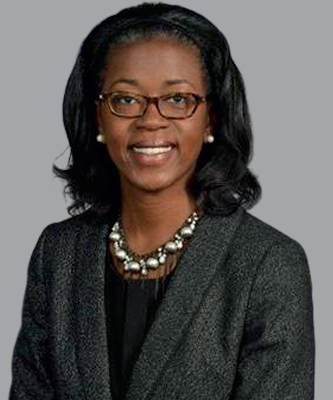
Dr. Tamarah Duperval-Brownlee
(Washington, D.C.) February 28, 2019 – Tamarah Duperval-Brownlee, MD, MPH, MBA, will serve in the newly created role of Senior Vice President and Chief Community Impact Officer (CCIO) for Ascension, effective March 4. In this role, Dr. Duperval-Brownlee will provide direct oversight for the development and implementation of strategies and performance delivery to transform communities within Ascension markets, including health villages such as the one Ascension is creating in Washington, D.C., that socially integrate healthcare and non-healthcare partners to optimize the physical, mental, and financial health and well-being of a defined community. Additional responsibilities include collaborating with partners to advance health equity thorough community health improvement and affecting the community-based social determinants of health to enable fulfillment of strategic goals through investment and program development. Dr. Duperval-Brownlee’s role will be based in Washington, D.C., and she will provide immediate oversight of the ongoing trans-formation of the Providence Health System campus to better address unmet health and social needs of persons residing in the local communities. In addition to providing leadership for developing health villages across Ascension, Dr. Duperval-Brownlee will continue her work in advancing health equity and performance on the Ascension goal to eliminate preventable healthcare outcome disparities, as well as oversight for the Ascension Community Health Ministries. Dr. Duperval-Brownlee currently serves as Ascension Vice President of Care Excellence. During her tenure, she has led several national quality improvement initiatives, the development of Ascension’s strategy to advance health equity and the performance on the Ascension goal to eliminate preventable healthcare outcome disparities. She also provides operational and clinical oversight of Ascension’s Community Health Ministries. Her previous roles include President of Medical Affairs and CEO of Clinical Operations/Chief Medical Officer at Lone Star Circle of Care and Clinical Assistant Professor in Family Medicine at Texas A&M Health Science Center. Dr. Duperval-Brownlee received her Bachelor of Science degree in chemical engineering with a concentration in biomedical engineering from Northwestern University. She received her Master of Public Health from the Harvard University School of Public Health, specializing in healthcare policy and maternal child health and a Physician Executive Master of Business Administration, the University of Tennessee-Knoxville. Her medical degree was earned at the University of Illinois College of Medicine.
Alexy Arauz Boudreau named Medical Director of the Medicaid ACO at the MGH/MGPO
We are thrilled to announce that Dr. Alexy Arauz Boudreau will become the Medical Director of the Medicaid ACO at the MGH/ MGPO. In this capacity, Dr. Arauz Boudreau will lead the effort to build optimal models of care for the MassHealth Medicaid ACO patient population. The focus of this work is to improve upon pro-grams that address social determinants of health, continuity of care, substance use disorders management, and behavioral health access for our most vulnerable patients. Dr. Arauz Boudreau is a member of the Massachusetts General Hospital Division of General Pediatrics and practices as a primary care pediatrician at MGH Chelsea HealthCare Center. She received her medical degree from Harvard Medical School and a Masters in Public Health from the Harvard School of Public Health. She has completed the Harvard Pediatric Health Services Research Fellowship and the Mongan Commonwealth Fund/Harvard University Fellow-ship in Minority Health Policy. Dr. Arauz Boudreau is an academic community pediatrician with a focus on improving the health of vulnerable populations through primary care re-design, research, and community initiatives. As the Massachusetts General Hospital for Children (MGHfC) Director for Pediatric Population Health Management, she has taken a lead role in trans-forming MGHfC pediatric primary care practices into patient centered medical homes and implementing population health management and quality improvement programs. For vulnerable children and adolescents who require additional health care services, she has spearheaded the development of the MGH pediatric integrated care management program to enhance primary care providers’ ability to coordinate the delivery of patient care services along the continuum of health care. In addition, she has been leading efforts to implement the pediatric response to the MassHealth Medicaid ACO at the Massachusetts General Hospital. |
|
HEALTH POLICY BRIEF
By Chloe Slocum, MD, MPH, RS ‘17
At the start of 2019, value-based initiatives remain top-of-mind for employers, payers, and federal officials as the Centers for Medicare & Medicaid Services (CMS) continued with the rollout of a new bundled payment model (Bundled Payments for Care Improvement – Advanced) and implemented an overhaul of the Medicare Shared Savings Program for accountable care organizations (ACOs). Numerous stakeholders launched or announced their support for projects focused on social determinants of health (SDOH) or community-based services in an evolving dialogue about how nonmedical factors influence long-term clinical outcomes and health care costs. Several health system partnerships and state demonstrations reported that they would focus on improving housing security for vulnerable populations and major trade groups backed the creation of new codes for SDOH to standardize and enhance data collection. In the new Congress, several proposals to expand public options for health care coverage have emerged, including so-called “Medicare for All” and “Medicare expansion” initiatives. Tackling rising drug prices and the practice of “surprise billing” for patients who receive care at in-network facilities but are unknowingly charged for out-of-network services (e.g. contracted diagnostic testing or physician services) have both emerged as areas of bipartisan focus. While numerous states have submitted proposals to implement Medicaid work requirements, they have faced legal challenges and data from Arkansas – the only state currently to enact work requirements – has shown little evidence to suggest improvements in health care coverage or employment rates. Mean-while, hospitals receiving Medicaid Disproportionate Share Hospital (DSH) payments may see allotment reductions in October 2019 if Congress does not act to delay cuts.
Chloe Slocum, MD, MPH Instructor, Physical Medicine and Rehabilitation
Harvard Medical School / Spaulding Rehabilitation Hospital
http://spauldingrehab.org/
Pronouns: She/Her/Hers
Dr. King would want us to fight for Medicare For All
By Dr. Sanjeev Sriram
Opinion Contributor
REPRINTED FROM THE HILL – Despite vehement opposition from the American Medical Association, Medicare and Medicaid were passed into law in 1965. Importantly, the federal government required participating hospitals to comply with the non-discrimination rules of the Civil Rights Act of 1964. Hospitals and doctors who wanted payments from Medicare and Medicaid were mandated to provide all medical services to minority patients and to hire medical personnel regardless of race. Nonetheless, before Medicare was officially launched in July 1966, there were still many hospitals and clinics that continued to discriminate against patients and families on the basis of race.In March 1966, Dr. Martin Luther King, Jr. and his allies at the Medical Committee for Human Rights called for non-violent direct action, lawsuits, and complaints to the federal government against such hospitals. Dr. King and the MCHR identified the then-segregated American Medical Association as complicit with the discrimination and racism practiced by hospitals across the country. They accused the AMA of a “conspiracy of inaction” in civil rights. Dr. King then elaborated, “We are concerned about the constant use of federal funds to support this most notorious expression of segregation. Of all the forms of inequality, injustice in health is the most shocking and the most inhuman because it often results in physical death. I see no alternative to direct action and creative nonviolence to raise the conscience of the nation.”
Thanks to the persistent efforts of civil rights activists, including many minority medical professionals denied membership by the AMA and state medical societies, Medicare and Medicaid delivered better health care to millions of minority patients. Sadly, because of conservative backlash against civil rights and the social safety net, additional progress in health justice would be very slow for the rest of the 20th century. Disparities in minority health persisted or worsened.
Since it was passed in 2010, the Affordable Care Act has made an enormous positive impact on the lives of millions of Americans. For minority communities, the ACA has provided the greatest extension of health justice since the passage of Medicare and Medicaid. Among non-elderly blacks, the uninsured rate decreased from 17 percent to 12 percent. For non-elderly Latinx, the uninsured rate decreased from 26 percent to 17 percent and for Asians, from 15 percent to 8 percent. The expansion of Medicaid has proven to be the most important factor in reducing these coverage disparities, covering a quarter of black and Latinx adults and over half of black and Latinx children.
Yet there continue to be shocking injustices for Americans trying to access their basic human right to health care. In 2012, the Supreme Court ruled the ACA’s Medicaid expansion is not mandatory for states. Since then, many governors and state legislatures continue to deny health care to millions. Many states make eligibility and enrollment in Medicaid onerous for patients and families struggling with low incomes and poor health. Republicans in Congress have repeatedly attacked the ACA. The Trump administration continues to undermine Medicaid and the health insurance exchanges. All of these policy decisions have racist impacts and contribute to inequities in health: Over half (59 percent) of America’s uninsured are people of color.
Now is the time to once again raise the conscience of our nation, especially as our minority communities become the majority of the population. We can not continue to leave health care as a privilege that depends on where you live, what you earn, or what you look like. To guarantee health care as a basic human right and bend our moral arc toward justice, we must pass Medicare For All.
Skeptics and critics of Medicare For All say the policy is “unrealistic” for America’s health care “system.” Whenever I hear those critiques from conservatives, moderates, AMA leaders, and so-called progressive allies, I think of how Dr. King responded to his contemporaries who criticized the “unrealistic” demands of civil rights activists.
To paraphrase his Letter from a Birmingham Jail, it should be unrealistic for black mothers to die at three times the rate of white mothers. It should be unrealistic for black babies to be twice as likely to die as white babies. It should be unrealistic for Latinx children to be twice as likely as white children to lack coverage for health care. It should be unrealistic for insurance company executives and Big Pharma corporation CEOs to take home billions of dollars while 40 percent of Americans do not have $400 available for an emergency. Millions of Americans are rejecting these unjust realities across American health care and support Medicare For All.
But won’t Medicare For All be disruptive for American health care? I certainly hope so. For years I have listened to academics, technocrats, hospital executives, and other health policy “experts” exaggerate the value of tinkering at the edges of our broken health care system and patiently waiting for half-measures to bear fruit. I have attended too many conferences, webinars, and lectures that repeatedly describe how change can only happen slowly.
To my colleagues in academic medicine, public health, and policy, I have to ask: Are we serious about dismantling the “obnoxious negative peace” of America’s current health care system, where profiteering is comfortable and patients suffer needlessly? If we, as health care providers, health justice advocates, and everyday Americans are truly dedicated to making health care a basic human right in reality and not just rhetoric, then we are obliged to remodel our comfort zones -- and to do so with urgency.
Making health care a basic human right through Medicare For All is a civil rights journey. Throughout these endeavors, we will be tested in many ways because “all” has always been the heaviest word in American history. We struggle to extend liberty and justice to all of us, whether that be in voting, criminal justice, fair pay, clean air and water, immigration, and so on. Health care justice for all will be similarly difficult -- but not impossible -- if we are serious about the urgency of now.
Medicare For All requires us to follow the lead of the real Dr. King who disrupted negative peace and comfort zones, who urged those who yearn for justice “to use time creatively, in the knowledge that the time is always ripe to do right. Now is the time to make real the promise of democracy and transform our pending national elegy into a creative psalm of brotherhood. Now is the time to lift our national policy from the quicksand of racial injustice to the solid rock of human dignity.” Now is the time for Medicare For All and for health care to be a basic human right regardless of where you live, what you earn, or what you look like.
Dr. Sanjeev Sriram is a senior adviser for Social Security Works and a graduate of the Chan School of Public Health at Harvard.
